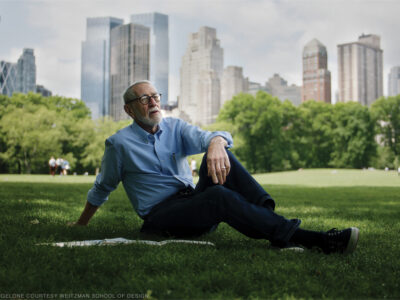
Class of ’03 | Like the heroes of a certain hit movie, Fred Berger C’03 went to Hollywood in his 20s with dreams of stardom. Unlike many dreamers, his came true—as they did for his young collaborators: Damien Chazelle and Justin Hurwitz, the director and composer of La La Land.
That throwback romantic musical won six Academy Awards—seemingly seven, until the infamous Oscars mix-up was unmixed on stage to reveal that Moonlight was in fact the Best Picture winner—as well as seven Golden Globes (including Best Picture in the category of Musical or Comedy); it has already grossed roughly $450 million. Berger was one of four producers, along with Marc Platt C’79, Jordan Horowitz, and Gary Gilbert. And he was in on it from the beginning.
“That movie is about us,” Berger said recently. “We constructed that movie by taking our experiences in a business that is hyper-competitive, brutal, and crushing. It’s a place where victories are hard-won. [But] those good moments are so good.”
Berger was discussing his experiences a few months ago in his hometown of Mamaroneck, New York, where the Penn Club of Westchester and Rockland counties gathered for a private screening of La La Land and a conversation between him and Peter Decherney, professor of cinema studies and English.
La La Land evolved from Chazelle’s 2010 pitch to Berger and Horowitz for a new musical, set in Los Angeles, about a jazz musician and an actress who fall in love. The pitch was a hit. The movie’s opening scene—a joyous musical dance number with 100 dancers moving amid cars stopped in traffic on an LA freeway ramp (filmed during a sweltering September heat wave)—captured the vulnerable ebullience of those who arrive in Tinseltown with their silver-screen dreams.
“It seems happy and joyful, but what they are talking about is how brutal this town is and how painful it is to get rejected every day,” said Berger. “They sing about failing, but how tomorrow it’s going to be sunny. That was the experience of making that movie—years of failure and rejection.”
Failure seemed a possibility early on when two high-wattage actors—Emma Watson and Miles Teller—had to bow out because of scheduling conflicts, leaving the musical without the star power Berger needed to recreate the feel of a 1950s musical. That’s when he connected with Platt, the hit-making Broadway and Hollywood producer [“Passion Plays,” May|June 2006], who had previously worked on three films with Ryan Gosling, La La Land’s eventual leading man.
Platt became a leading man in the movie’s Penn cast, which also included John Legend C’99 Hon’14 (acting, not singing) and Monique Péan C’03, who created some of the jewelry worn by Emma Stone, Gosling’s co-star. Platt not only made things happen, but he did so with grace.
“Marc was so disarming and gracious,” said Berger. “He told us his only goal was to be part of our family and protect the beautiful thing we had created. He became a friend and a mentor. We were just all colleagues in the trenches, making a movie together.”
As a producer, Berger explained, he is involved in every aspect of a film—reading scripts, finding locations, hiring the crew, raising money, working on set with the director, and finally marketing it. Now a partner at Automatik Entertainment, he variously compared his role to that of an orchestra conductor, a wedding planner—even a parent, with the film crew his large family and the movie a beloved child.
“I curate the movie from the first moment to its last,” he said. “You protect the filmmaker, and you push the filmmaker to articulate the vision he or she expressed to you, in its purest form.”
Though Penn didn’t offer a film-studies major until after he graduated, he went there to immerse himself in the liberal arts, knowing that there were opportunities to learn about film as well. He majored in philosophy, politics, and economics—perfect for a pre-law student. But he minored in film (and French), starting what he called “a two-front competition between movies and law.”
A screenwriting class with Mark Lapadula led to an independent study. Then came the summer internship with ThinkFilm (a fledgling independent film distributor in Tribeca) and a senior-year gig hosting campus screenings for Dreamworks and Sony Pictures. Goodbye, law school.
“By senior year, it wasn’t a close call,” Berger said. “I was going into the movies. I was doing the most menial tasks at work, and I was elated. I had a burning thirst to work in the business.”
After graduation, he did another internship with Focus Features. He was living at home, waiting tables at night, and thriving in Tribeca’s vibrant film world. There he met producer Ross Katz, who eventually hired him. Soon Berger found himself in Paris, working on Marie Antoinette, directed by Sofia Coppola.
“I was 23, and still wearing Abercrombie,” Berger recalled. “There I was in Paris, with Coppola, and discussing film with Quentin Tarantino.”
When he first arrived in LA, Berger slept on a couch belonging to Dan Parry C’03, who is not at all surprised by his friend’s success.
“Ever since he made that decision [to make a career in movies], he was like a laser, zoomed in on what’s important,” says Parry. “He stayed true to his vision: to make quality films, which can change the way people think about the world.”
In 2009 Berger became an associate producer on Taking Chance, a Ross Katz film starring Kevin Bacon. A year later, having decided to strike out on his own, he was approached by Chazelle about a project. And the rest is cinematic history.
“My Dad gave me the idea that I needed to be my own person,” Berger said. “I needed to take a leap and do something very uncomfortable. I didn’t have money, nor was I attached to directors or actors. I had to really fake it well. I believed in my abilities, and I made a bet on quality rising to the top.”
That bet paid off big-time with La La Land.
“When you are on the set, watching actors who are great, doing what they do well, with the cinematographer and the director, this whole massive family in the service of telling this weird little story that may or may not connect with people,” Berger said, “it’s such a high, such a rush, so addictive, we just can’t give it up.”
—David McKay Wilson




